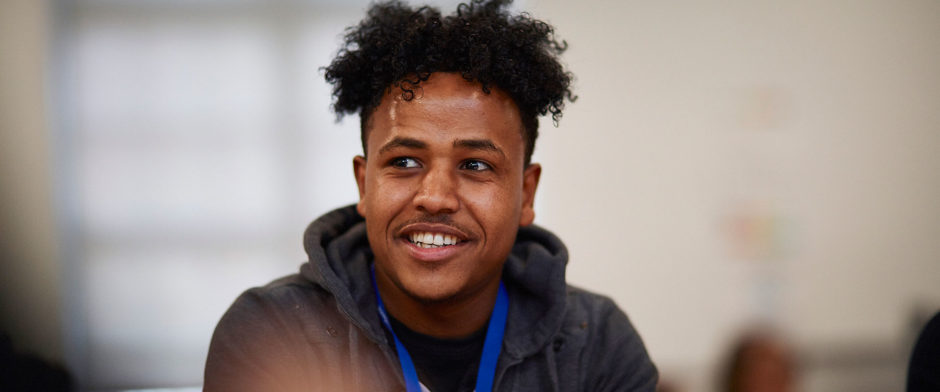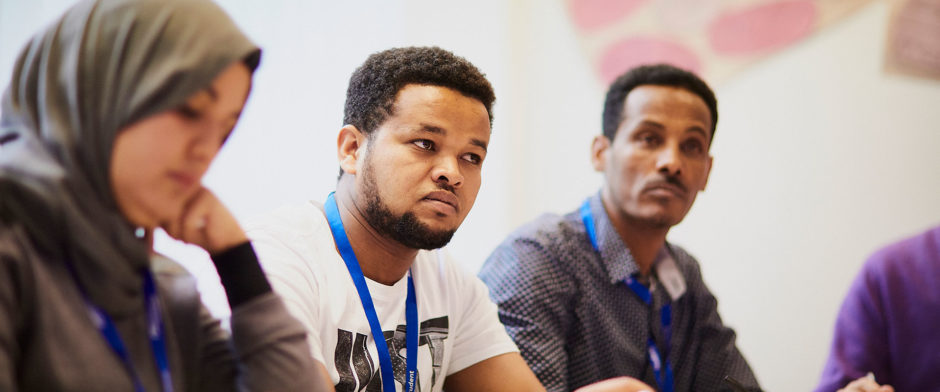Welcome to Sunderland College, where we are proud to provide an inclusive and diverse learning environment to help students open doors to a vast array of opportunities.
Our ESOL (English for Speakers of Other Languages) courses offer more than just learning basic English skills, they are designed to empower individuals from diverse backgrounds to thrive in an interconnected world. Our ESOL curriculum goes beyond grammar and vocabulary; it offers a gateway to increasing confidence, career advancement, and those all-important meaningful connections.
We welcome students from our diverse communities

If English is not your first language, we can assist and support you to develop your English skills. This will support you in your next steps, whether in education or employment in the UK. In addition, there will be opportunities to extend your learning experience by accessing a range of different curriculum subject areas. You will receive pastoral support with a focus upon your engagement, progress and wellbeing.
Our ESOL courses from Pre-Entry to Level 2 will develop your speaking and listening, writing and reading skills. We can offer you a bespoke programme tailored to your individual needs.
Whether you are navigating a new country, looking to pursue higher education, or aiming to excel in your career, proficiency in English is fundamental. The ESOL courses we offer are delivered in a supportive and immersive learning environment where you will not only master language skills but also embrace a vibrant community of staff and students.
As an ESOL student, you will be part of the college community studying and socialising with other students from a broad range of cultures. You will have the opportunity to be involved in a range of activities, in college, across the region and in the local community to enrich your learning and experience.
You may be eligible for a range of financial support. The support available may vary depending on if you are a school leaver (aged 16-18) or an adult (aged 19+).
To be eligible for financial support, your household income must be less than £30,000 and you must live one mile away from college.
You will need to complete a bursary application. To complete the application, click here.
To complete a paper application, please contact welfare@educationpartnershipne.ac.uk.
If you need support with your application, please speak to a member of the lecturing staff, or visit the Future Ready Hub.
If you are aged 16-18, you may be eligible for free meals or vulnerable bursary support.
If you are in receipt of the following benefits, you may be able receive meals on the days that you attend college:
Unaccompanied asylum-seeker children that are the responsibility of the local authority may be eligible for vulnerable bursary support. To obtain the bursary, we would need to see evidence in the form of a letter from the local authority.
If you are aged 19+, you may be eligible for support with travel expenses to college.
If you do not have a bank account, you can still claim travel vouchers (if eligible) from our Future Ready Hub.
As part of your financial support application, we will need the following evidence:

As a college, we are committed to supporting the College of Sanctuary’s charter and organisational values including inclusivity, openness, participation, inspiration, and integrity, so that we too can play a significant role in our region, to support building a more welcoming UK for people seeking sanctuary and migrants to the UK.
Find out more about our pledge"Every lesson we learn new words and grammar rules in English."
"In college I met good people from different countries."
"I’d like to express my gratitude for your teaching, mentorship, and for bringing out the best in me."
"Every lesson we learn new words and grammar rules in English."
"In college I met good people from different countries."
"I’d like to express my gratitude for your teaching, mentorship, and for bringing out the best in me."
"Every lesson we learn new words and grammar rules in English."
ESOL stands for English for Speakers of Other Languages.
In many cases the courses are free depending on students’ status, however, if there is a fee the cost may be between £300 to £600 per term.
The cost of an ESOL course depends on the course unit. For example, Speaking and Listening course is more expensive than Writing and Reading courses.
There are six levels in an ESOL programme:
The level you will be enrolled on will be decided following an initial assessment.
No, you don't need to pass an exam to enrol on an ESOL course. Before you start the course, you will come into college to complete an initial assessment of your English, which will help to determine what level is best for you to study.
No, we have three separate courses for Speaking, Writing and Reading. This means you can study each course at the level that is appropriate for you. For example, you might study Speaking and Reading at Entry Level 3 but study Writing at Entry Level 2.
Each level is a one-year programme consisting of three terms:
For adults (age 19+) the course is part-time.
For 16–18 year old students (school leavers), the course is full-time.
Speaking and Listening Skills are taught during term 1 and Writing Skills are taught during term 2. Reading Skills are taught during term 3.
There will be opportunities to practise all four skills in each term.
Currently, the classes are held at our Bede Campus. This is located on Durham Road, Sunderland SR3 4AH.
We recommend you attend an Open Event in the first instance as this provides an opportunity to meet the ESOL staff, view the ESOL learning environment and find out about the courses we offer.
You can enquire on our website by clicking the ‘Enquire’ button on the course page.
You will then be invited to college for an interview and assessment to identify the most appropriate level to suit you.
Once the level is determined, you will be asked to attend an enrolment event.
The enrolments are held three times a year, just before the start of each term (August, December and March).
If you are eligible for student bursary and live at least 1 mile from campus, you will receive support to cover your travel costs.
If you are an asylum-seeker, you can get bus tickets from college to get to and from your lessons.
If you claim Universal Credit, your job coach can give you tickets to get to and from lessons.
Unfortunately, there are no childcare facilities at the campus. If you are eligible for a student bursary, you will be able to receive support with childcare costs.
The Speaking and Listening course is assessed through an oral exam, which is video-recorded.
The Writing and Reading courses are assessed through an hour-long written test.
Yes, students will receive a certificate if they pass their exams. At the end of each short course, you will sit an exam. If you pass the exam, you will get a certificate from a national awarding organisation.
Yes, the certificates students receive on this course are nationally recognised.
Unfortuantely, you cannot study ESOL online. All ESOL courses are delivered in-person to provide a positive learning experience and support integration into the wider college community.
There are no evening or weekend ESOL classes at the moment. All classes are delivered on weekdays during the day.
There are sports facilities and a free gym available at Bede Campus. For further information about the sports facilities at college, reception staff can direct you to the sports team.
There is a programme of weekly activities ran by the Student Participation team. Staff in the Future Ready Hub will provide more information.
Yes, we organise a range of multi-cultural activities throughout the year and encourage ESOL students to participate. Some of these activities include Refugee Week, International Cultural Day and New Year competitions, among others.